MercoPress. South Atlantic News Agency
Brazil central bank lowers basic rate to 9.25%; expected to reach 8% by end of 2017

Brazil's central bank cut interest rates below 10% for the first time in nearly four years on Wednesday, keeping a fast pace of monetary easing as plunging inflation gave it leeway to aid an incipient recovery.The bank's nine-member monetary policy committee, known as Copom, cut its benchmark Selic rate by 100 basis points for the third straight time to 9.25%.
It was the seventh cut since October in a cycle expected to take rates as low as 8% by the end of the year. The last time the Selic rate was below 10% was in November 2013.
The bank said it could continue to cut rates at this pace at its September meeting, depending on the economic scenario.
Lower interest rates should help Brazil's economy accelerate after its worst recession on record ended in the first quarter. Inflation, which surpassed 10% less than two years ago, has plunged to just 2.78%, the lowest in 18 years and below the lower bound of the official goal.
Copom's baseline scenario release follows: The set of indicators of economic activity released since the last Copom meeting remains consistent with stabilization of the Brazilian economy in the short run and gradual recovery. The recent increase in uncertainty regarding the evolution of reforms and adjustments in the economy had a negative impact on confidence indices. However, available information suggests that the impact of this drop in confidence on economic activity has been limited so far.
The global outlook has been favorable, as global economic activity remains on a gradual recovery path, without pressuring financial conditions in developed economies. This has contributed to support risk appetite towards emerging economies. In addition, changes in economic policy in some central economies have become less likely;
Inflation developments remain favorable. Disinflation is widespread and includes IPCA components that are most sensitive to the business cycle and monetary policy. So far, the short-run effects of higher uncertainty regarding the evolution of reforms and adjustments in the economy have been neither inflationary nor disinflationary;
Inflation expectations collected by the Focus survey for 2017 and 2018 fell to around 3.3% and 4,2%, respectively. Expectations for 2019 are around 4.25%, and expectations for 2020 are around 4.00%.
The Copom's inflation projections for 2017 and 2018 in the scenario with interest rate and exchange rate paths extracted from the Focus survey retreated to around 3.6% and 4.3%, respectively. This scenario assumes a path for the policy interest rate that ends 2017 at 8.0% and remains at that level until the end of 2018.
Taking into account the baseline scenario, the balance of risks, and the wide array of available information, the Copom unanimously decided to reduce the Selic rate by one percentage point, to 9.25% per year, without bias. The Committee judges that convergence of inflation to the 4.5% target over the relevant horizon for the conduct of monetary policy, which includes 2018, is compatible with the monetary easing process.
The Copom emphasizes that the extension of the monetary easing cycle will depend on cyclical factors and on estimates of the structural interest rate of the Brazilian economy. The Committee judges that the evolution of reforms and adjustments in the economy (especially those that pertain to fiscal and credit policies) is important for the reduction of estimates of the structural interest rate. The Committee will continue to reassess these estimates over time.
The Copom emphasizes that, despite the increase in uncertainty regarding the evolution of reforms and adjustments in the economy, the continuation of economic conditions so far has allowed the same pace of monetary easing at this meeting. Regarding the next Copom meeting, maintenance of this pace will depend on the continuation of conditions described in the Committee's baseline scenario and on estimates of the extension of the monetary easing cycle. The pace of easing will continue to depend on the evolution of economic activity, the balance of risks, possible reassessments of the extension of the cycle, and on inflation forecasts and expectations.
The following members of the Committee voted for this decision: Ilan Goldfajn (Governor), Anthero de Moraes Meirelles, Carlos Viana de Carvalho, Isaac Sidney Menezes Ferreira, Luiz Edson Feltrim, Otávio Ribeiro Damaso, Reinaldo Le Grazie, Sidnei Corrêa Marques, and Tiago Couto Berriel.




Top Comments
Disclaimer & comment rules-

Read all commentsFROM Reuters:
Jul 30th, 2017 - 03:38 pm 0“Brazilian federal judge Sergio Moro, the man behind Brazil's largest ever corruption investigation, said there is still lack of interest from the country's political establishment to fight corruption, despite the political and economic crisis the practice sent the country into”
REF: http://www.reuters.com/article/us-brazil-corruption-judge-idUSKBN1AF0M9
Commenting for this story is now closed.
If you have a Facebook account, become a fan and comment on our Facebook Page!